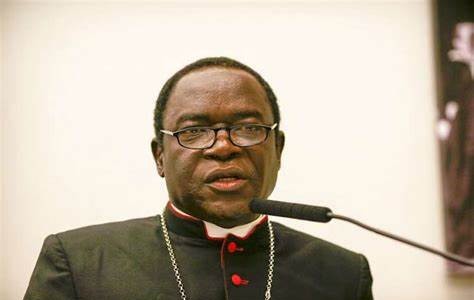The Bishop of Sokoto Diocese, Mathew Hassan Kukah, has expressed deep concern over the recent tragic stampedes in Oyo, Anambra, and Abuja, attributing them to the government’s failure to address the growing hunger and desperation in Nigeria.
In his Christmas message to Christians, Bishop Kukah lamented that Nigeria, despite gaining independence over 60 years ago, is still grappling with darkness, largely due to a lack of visible progress and an unwillingness to embrace light.
“Imagine if we let the light shine on our public service, on our politics, on our individual, community, and national life, on our public institutions. Imagine what Nigeria would be like if we chose light instead of darkness. Our journey to greatness is still severely constrained by the forces of ethnicity, nepotism, and greed. There is still the lingering anxiety that ethnicity and religion trump common citizenship in terms of access to opportunities. Feelings of exclusion drive citizens to the fringes of violence and frustration,” he said.
The Bishop called for unity and a better embrace of Nigeria’s diversity, stressing the ideals of the national anthem. “We are still unable to come to terms with the ideals of our national anthem that says: though tribe and tongue may differ, in brotherhood we stand. Diversity is a gift of God. Let us use it effectively as a tool for national mobilization and cohesion.”
Bishop Kukah also addressed the barriers discouraging Nigerian youth from engaging in politics, highlighting the costs of running for public office as a significant challenge. “In 2018, the passage of the Not Too Young to Run Bill was widely greeted by young people who believed that the doors had now opened for their active engagement in politics. After a few elections, many young people have been elected at various levels. This is commendable. However, problems of internal democracy, the costs of running for public office, still remain major obstacles for youth participation in politics,” he noted.
On education, he commended the federal government for introducing educational loan schemes and urged for its extension to vocational and technical training. “The act should not limit access only to university students but to those also seeking vocational or technical skills. Hopefully, in future, poverty should not exclude anyone from a good education. We encourage the youth to seize this opportunity with both hands,” he said.
While recognizing progress in combating insecurity, Bishop Kukah called for a structured and comprehensive approach. “Insecurity is the first child of corruption. We cannot win the war against insecurity without addressing the issues of unemployment and violent religious extremism which create the conditions for violence,” he emphasized.
Reflecting on the recent stampedes at food distribution points, he described the incidents as avoidable tragedies resulting from widespread desperation. “The tragedies that occurred in Okija, Ibadan, and Abuja where innocent people lost their lives in stampedes at food distribution points are a metaphor for the situation of desperation that citizens have been thrown into. The failures of government to respond concretely toward ending the horrible crisis of hunger and desperation has created the conditions for these avoidable tragedies. Citizens are lapsing into despair,” he said.
He further urged the government to collaborate with institutions like the Catholic Church that provide aid to the needy. “The Catholic Church is not new to providing succour for the needy and vulnerable. Under the auspices of St. Vincent de Paul, the Church continues to provide succour to the poor across the wider society. Government needs to work more closely with institutions that help to promote the common good of our society. May God grant eternal rest to the dead and console their families. It is the duty of government to ensure minimum dignity for our people,” he concluded.

